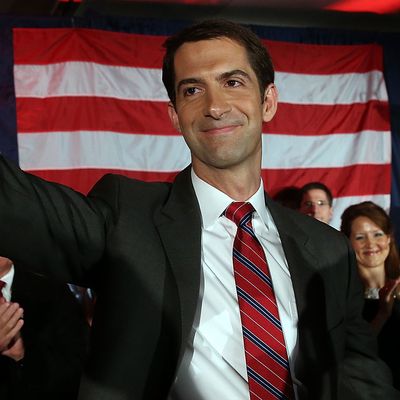
Senator Tom Cotton, whose letter warning Iran that any nuclear deal will not last beyond the term of the Obama administration was signed by 47 Republican Senators, is the future of neoconservatism. His career has been nurtured from the outset by old-line neoconservatives like William Kristol, who turns out, unsurprisingly, to have “consulted” with Cotton on the idea. And the Iran letter turns out to be a perfect little synecdoche of neoconservative policy.
The letter episode contains all the characteristic traits of a neoconservative project. First, of course, is the wild confrontationalism, which in this case was directed not against Iran but against the Obama administration. It may not be treason for the Senate to undermine the president’s negotiations with a foreign power, but it surely represents the bluntest and most hostile possible exercise of opposition to the executive branch’s strategy. Kristol’s advice in any situation, domestic or foreign, is for his side to display maximum belligerence, and the Cotton letter reflected that impulse.
Second, the letter was drafted and signed with maximum haste and a total contempt for planning or serious thought of any kind. “It was kind of a very rapid process. Everybody was looking forward to getting out of town because of the snowstorm,” confessed John McCain. “Many of the 47 signatories reasoned that Senate Majority Leader Mitch McConnell’s endorsement was vetting enough,” notes former Bush administration speechwriter Michael Gerson, disgustedly. “There was no caucus-wide debate about strategy; no consultation with Senate Foreign Relations Committee Chairman Bob Corker (R-Tenn.), who has studiously followed the nuclear talks (and who refused to sign).” Most people who signed on did so because they assumed somebody else had thought through the details. It was the Iraq invasion of foreign-policy maneuvers.
Third, the ploy has failed even by the standards of its own logic. The neoconservative plan for Iran is to undermine Obama’s Iran deal and replace it with what Benjamin Netanyahu called, vaguely, a “better deal.” The sequence of this strategy requires getting a bipartisan Senate group to impose more stringent sanctions on Iran, thus forcing Iran away from the table, and then securing international cooperation for stricter sanctions.
This plan never had much chance of success. But Cotton’s letter makes the chances much more remote. The partisanship of the letter undermines the prospects of any additional Democrats giving the Iran sanctions bill the veto-proof majority it needs. And if Iran does walk away from negotiations, it will argue that negotiations were sabotaged by Republican ultrahawks, not its own recalcitrance. That would make the international cooperation required for effective sanctions even harder to round up. As Gerson puts it, “this approach depends on the tightening of sanctions in cooperation with Europe, as well as Russia and China. And this effort can be held together only by the impression that the United States has negotiated with Iran in good faith.”
And, then, finally, there is the stubborn refusal to concede the plan has backfired even in the face of overwhelming evidence. Numerous Republican signatories have admitted, tacitly or overtly, that the letter was a mistake. Senator Pat Toomey concedes he “didn’t have any particular anticipation of the level of controversy.” His colleague Ron Johnson now says maybe the letter should not have been addressed to the Iranian regime. But Kristol regards the concession of error as a form of weakness. His response to his own party’s queasiness at its hastily conceived and botched maneuver is the same as it was when the Iraq occupation began to disintegrate. He is scolding the doubters for their halfheartedness and calling for renewed willpower:
If brow-furrowing were thinking, the Republican establishment would be geniuses. If hand-wringing were prudence, GOP politicians would be exemplars of Aristotelian virtue. If tongue-clucking were eloquence, conservative elites would be orators for the ages.
His Weekly Standard colleague Stephen Hayes, author of a book touting the connection between Saddam Hussein and al Qaeda, insists the Cotton letter has succeeded spectacularly. “The Cotton letter has already achieved its goal,” writes Hayes, “We are, finally, engaged in a serious national debate about the threat from Iran.” You may think people were already debating Iran before Cotton’s letter, and you may further think the letter has changed the subject from Obama’s negotiating strategy (which may or may not work) to the GOP’s highly controversial attempt to subvert it. But you’d be wrong, say the neocons. It was a cakewalk.






























